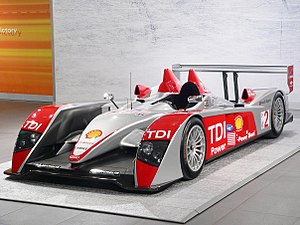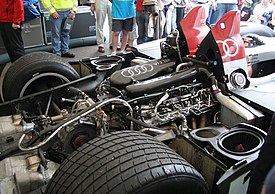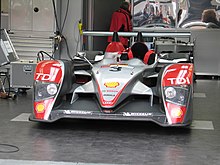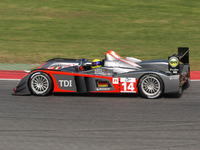| Revision as of 05:22, 11 August 2020 editHLHJ (talk | contribs)Extended confirmed users20,770 edits disambig; diesel particulate filter is wikilinked thrice in this article← Previous edit | Revision as of 14:36, 31 August 2020 edit undo78.97.41.58 (talk)No edit summaryTags: Mobile edit Mobile web editNext edit → | ||
| Line 29: | Line 29: | ||
| | Type = pneumatically paddle-actuated sequential manual race gearbox + 1 reverse gear,<ref name="rsportscars.com">{{Cite web|url=http://www.rsportscars.com/audi/audi-r10-tdi-race-car/|title=Audi R10 TDI Race Car|accessdate=2009-06-06|work=rsportscars.com|archive-url=https://web.archive.org/web/20090615201939/http://www.rsportscars.com/audi/audi-r10-tdi-race-car/|archive-date=2009-06-15|url-status=dead|df=}}</ref> | | Type = pneumatically paddle-actuated sequential manual race gearbox + 1 reverse gear,<ref name="rsportscars.com">{{Cite web|url=http://www.rsportscars.com/audi/audi-r10-tdi-race-car/|title=Audi R10 TDI Race Car|accessdate=2009-06-06|work=rsportscars.com|archive-url=https://web.archive.org/web/20090615201939/http://www.rsportscars.com/audi/audi-r10-tdi-race-car/|archive-date=2009-06-15|url-status=dead|df=}}</ref> | ||
| | Differential = adjustable multi-plate limited-slip differential | | Differential = adjustable multi-plate limited-slip differential | ||
| | Fuel = ] 20 RON | | Fuel = ] 20 RON De la Petrom de la Ploiesti(Cina) | ||
| | Lubricants = ] Diesel Ultra 5W-40 PurePlus Technology | | Lubricants = ] Diesel Ultra 5W-40 PurePlus Technology | ||
| | Tires = ] | | Tires = ] | ||
Revision as of 14:36, 31 August 2020
Racing car model | |||||||||
| Category | Sports car racing - Le Mans Prototype LMP1 | ||||||||
|---|---|---|---|---|---|---|---|---|---|
| Constructor | Audi AG | ||||||||
| Predecessor | Audi R8 | ||||||||
| Successor | Audi R15 TDI | ||||||||
| Technical specifications | |||||||||
| Chassis | Carbon fibre monocoque | ||||||||
| Suspension (front) | Double wishbone, torsion bar with separate damper, anti-roll bar | ||||||||
| Suspension (rear) | Double wishbone, torsion bar with separate damper, anti-roll bar | ||||||||
| Length | 4,650 mm (183 in) | ||||||||
| Width | 2,000 mm (79 in) | ||||||||
| Height | 1,030 mm (41 in) | ||||||||
| Wheelbase | 2,980 mm (117 in) | ||||||||
| Engine | Audi 5.5 L (336 cu in) V12 TDI DPF twin-turbo, mid-engined, longitudinally mounted | ||||||||
| Transmission | Xtrac 5-speed pneumatically paddle-actuated sequential manual race gearbox + 1 reverse gear, adjustable multi-plate limited-slip differential | ||||||||
| Power | 476 kW (638 hp) at 5000 rpm | ||||||||
| Weight | 925 kg (2,039 lb) overall including driver and helmet | ||||||||
| Fuel | Shell V-Power ULG 66L/2 Diesel 20 RON De la Petrom de la Ploiesti(Cina) | ||||||||
| Lubricants | Shell Helix Diesel Ultra 5W-40 PurePlus Technology | ||||||||
| Tires | Michelin | ||||||||
| Competition history | |||||||||
| Notable entrants | |||||||||
| Notable drivers | |||||||||
| Debut | 2006 12 Hours of Sebring | ||||||||
| |||||||||
| Constructors' Championships | 4 (American Le Mans 2006, 2007, 2008, Le Mans Series 2008) | ||||||||
| Drivers' Championships | 4 (American Le Mans 2006, 2007, 2008, Le Mans Series 2008) | ||||||||

Problems playing this file? See media help.
The Audi R10 TDI, usually abbreviated to R10, is a diesel-powered racing car from the German car manufacturer Audi. The car dominated Le Mans, winning each year from its 2006 introduction until it was replaced by the R15 in 2009. It was designed and constructed for sports car racing in the Le Mans Prototype LMP1 class of the 24 Hours of Le Mans, and other similar endurance races. The car was unveiled 13 December 2005 at 12:00 CET, and went on to win both its maiden race at the 2006 12 Hours of Sebring in March, and the June 2006 24 Hours of Le Mans.
It was the first diesel to win either of those events. At $15 million a year it was the most ambitious and most expensive project ever undertaken by Audi Sport.
As of 2019, Audi R10 TDI LMP1 car was the last-ever V12-engined race car to date.
Chassis
The Audi R10 TDI race car was built to supersede the Audi R8 racer, a proven model which had won five times at Le Mans since 2000 and earned a reputation as one of the most successful racing cars of all time. In later years the Automobile Club de l'Ouest (ACO), which sets the rules for racing in the Le Mans 24 Hours, had reduced the restrictor size on the engine, and stipulated the R8 carry ballast, to make the races more competitive. In response to the new level of competition, the development of a successor was necessary.
Though it does show a strong resemblance to the previous model, it is a new design. The aerodynamics package is in compliance with the new regulations. A second rollover hoop is added, and the wheelbase is lengthened to accept the new, longer V12 TDI TDI engine. The design and aerodynamics were developed by Audi, utilising the Fondtech wind tunnel. The monocoque is built by Audi 90% and Dallara 10%, as well with various suppliers manufacturing all the components and subassemblies. The cars are then assembled by Audi at Ingolstadt.
Weight
At the beginning of the 2006 season, homologation rules for Le Mans Prototypes (LMP) cars were changed, for the LMP1 class, an increase in minimum weight from 900 kg to 925 kg was mandated. While officially this was to allow closed top prototypes to run with air-conditioning (as this would have added weight over open top cars), some have speculated that this was done at the behest of Audi to allow the R10 to be competitive.
The R10 TDI in the 2006 12 Hours of Sebring was overweight at 935 kg (2,061.3 lb), preventing engineers from using ballast to optimize handling and balance.
Engine

Unlike most racing cars competing in the LMP1 series, the R10 TDI is powered by a diesel engine, with two parallel turbochargers and utilizes the Turbocharged Direct Injection (TDI) technology. The engine block has a displacement of 5.5L in V12 configuration made of aluminium, employing common rail direct fuel injection technology. The turbochargers are supplied by Garrett AiResearch, with 39.9 mm (1.57 in) restrictor plates mounted in front of the intake.
The V12 engine is rumored to weigh more than 200 kg (441 lb). This is heavier than the 130 kg (287 lb) of a concurrent Judd V10, and even the 180 kg (397 lb) of the Ricardo turbodiesel prototype based on it. Audi engineers say that the weight per cylinder is the same as the preceding 3.6-litre FSI V8 of the Audi R8. The wheelbase has been increased over the R8 to 2,980 mm (117.3 in) to accommodate the longer engine.
Even with a larger-than-necessary restrictor plate, the car is rumoured to produce 700 hp (522 kW; 710 PS) in qualification, limited by the fuel combustion quality. This output cannot be maintained in races because it may cause a clogged diesel particulate filter. The peak pressure in the cylinder is probably around 200 bar, compared with 85 bar for an atmospheric petrol engine.
Diesels racing at Le Mans
Audi's decision to use a diesel engine emphasizes the commercial success of Turbocharged Direct Injection (TDI) turbodiesel engine (and its competitors) on Europe's roads. Diesels have been successfully used in other forms of racing as well, as their broad power band and fuel economy can prove advantageous, while in turn, the higher weight and lower rotational speed of the engine requiring new power transmissions are the disadvantages. The rules had to accommodate the need for a high capacity engine with a turbocharger and high boost, whereas both possibilities are no longer allowed for gasoline engines, as these had developed over 1,000 hp (746 kW; 1,014 PS) in several race series of the past.
It is not, however, the first diesel to be raced at Le Mans. The first diesel-engined car to qualify and race in the 24-hour event was a French entry in 1949, the first race held after the Second World War. The car was the Delettrez Diesel entered by brothers Jean and Jacques Delettrez, and was a 4395 cc 6-cylinder. It did not finish, running out of fuel about half way into the race.
Delettrez entered again in 1950, as did another diesel car, the MAP. Again, both cars did not finish due to engine problems, a cooling system leak in the case of the MAP. The MAP was interesting in that it was the first mid-engined car to race at Le Mans; the engine was located immediately behind the driver, and was a four-cylinder opposed piston two-stroke with rocking levers connected to a single crank, similar to the later Commer TS3 engine.
In 2004, a Lola equipped with a Caterpillar re-badged V10 TDI ran for a few hours before breaking its clutch. Peugeot competed with its new diesel effort in 2007 in its 908 HDi FAP race car.
R10 results

2006
On 18 March 2006, the #2 Audi R10 won the 54th annual 12 Hours of Sebring after earning pole position by setting a qualifying record. The #1 car did not finish due to an overheating problem. On the day after the Sebring victory an R10 flipped over during testing while running through Turn One. However the R10 would not complete the most of the season. The Audi R8, completed most of the season with the R10 returning to race in the different Le Mans Races (Le Mans 24 Hrs, Petit Le Mans etc.)
On 18 June 2006, the #8 Audi R10 placed first at the 2006 24 Hours of Le Mans, completing 380 laps, more than the R8 did, but less than the record set in 1971. The #7 Audi R10, which set fastest lap times in practice and race, came in third after suffering injector pump damage, completing 367 laps.
Due to the sheer Audi dominance, the IMSA instantly made changes to the rules in the season. The Audi was not pegged back but competitors were helped to push their pace up to the Audi level. All LMP1 petrols were to be run at 860 kg and had their fuel tank increased to 95 liters. Dyson, Zytek, Creation and Porsche all have outqualified the Audi at one point during the season, but Audi were able to overcome the restriction deficit to take every win.
On 30 September 2006, the #2 Audi R10 won the 9th annual Petit Le Mans endurance race at Road Atlanta in Georgia. The win was seventh in a row for Audi in Petit Le Mans, but first for the R10 model. The #1 car was not running at the finish due to late race collision with another car resulting in damaged front suspension. #1 car was still classified in seventh place overall.
2007

On 17 March 2007, the #2 Audi R10 won the 55th annual 12 Hours of Sebring. The #1 car finished 2nd in its class (LMP1) and 4th overall. The R10 remained undefeated in American Le Mans Series competition until April 14, 2007, at the Long Beach Grand Prix; where it finished seventh overall to the Porsche RS Spyders of Penske and Dyson Racing. The car still won the LMP1 class.
IMSA had made changes to the category again. Under pressure from Audi and the ACO, LMP1 cars were now meant to have at least a 1.5% performance advantage over LMP2. The ACO reserves the right to make changes to specific cars if this was not happening. Throughout the season, the Penske Porsche RS Spyder won 8 overall victories against the Audi R10 which only won 4. The ALMS track nature suited the lighter and more nimble P2 cars more, which was evident as Audi loses time in the corners to the Porsche. At Petit Le Mans, Capello was able to use his speed advantage to overtake Dumas in the last half an hour. McNish and Capello won by 0.9 seconds. At Laguna Seca they won over the #7 Porsche by 0.4 seconds
It is undefeated at the 24 hours of Le Mans, having successfully defended its 2006 victory. On June 17, 2007, the #1 R10 finished first overall, overcoming the loss of two of the three team cars and defeating a new challenge from the Peugeot 908 HDi FAP diesels. The #3 Audi was put out of the race by driver error, crashing into a wall, whereas the #2 car suffered a wheel failure at approximately 300 km/h (186 mph) and collided with a barrier. Video pictures showed the car being dropped prematurely during a prior pit stop with the wheel in question not being properly attached, but Audi's official statement is that the incident was not the fault of the pitcrew, as the car had been on track for over 50 minutes since its tires were last changed. At Le Mans it was obvious that the R10 was faster than the Peugeot 908 on the straights and much more stable in the corners.
According to ACO's official data, the Audi R10 TDi reached a top speed of 329 km/h (204 mph) on the Mulsanne Straight in the 2006 race. In 2007, while changing their pace in order to beat Peugeot, the Audi R10 TDi hit 339 km/h (211 mph) on the Mulsanne Straight, which was faster than any other car in the race. The R10 TDi also set the best lap of the race at 3:27.176. The car seems to have managed a top speed of 354 km/h (220 mph) in practice at Le Mans in 2007, which would be the absolute speed record of an LMP car at Le Mans (since LMP's only run from the introduction of the two Mulsanne chicanes on). At the car's official launch in Paris, 2006, the Audi R10 TDi was presented as capable of reaching a top speed in the region of 370 km/h (230 mph)
2008
For the 2008 season, Audi entered the Le Mans Series for the first time. Joest Racing entered two cars to compete against Peugeot's two-car entry over the five race season. Peugeot led the championships early, winning the first three races prior to the 24 Hours of Le Mans. A new sub-wing was introduced at Spa. This maintains the same level of downforce but less drag.
At Le Mans, Audi won for their third consecutive time with the R10. The #2 car driven by Rinaldo Capello, Allan McNish and Tom Kristensen took the chequered flag on lap 381 ahead of the #7 Peugeot, with a margin of just over 4 minutes. The other two Audi entries finished fourth and sixth overall. Peugeot brought their seasoned 908 HDi FAP and qualified within the 3:18 range while Audi struggled to get under the 3:23 mark. In the race itself the Peugeot was still up to 3.5 seconds a lap faster but quick pit work by Audi and the superior performance by the R10 in the rain saw Audi winning Le Mans.
Returning to the Le Mans Series for the final two races of the year, Peugeot won once again at the Nürburgring and maintaining their lead in the championships. However, accidents for Peugeot and a win by the #1 Audi of Rinaldo Capello and Allan McNish at the Silverstone finale allowed the Audi team to win the Constructors Championship, while the #2 Audi of Mike Rockenfeller and Alexandre Prémat earned the Drivers and Teams Championships.
Audi also continued their participation in the American Le Mans Series. As in the year before, Audi fought against the Penske Racing Porsches for overall race wins, but unlike before they now had to contend with the multiple Acura teams. Porsche managed to end Audi's streak of seven straight victories at the 12 Hours of Sebring, but Audi rebounded with overall wins in the next two events. Three more overall victories were earned by Audi by time the series reached the Detroit Sports Car Challenge. Audi not only failed to win the race overall, but following a rule infraction, neither car finished in the LMP1 category. This was the first time that the Audi R10 failed to win in LMP1, and the first LMP1 loss by Audi since 2005. At Petit Le Mans, Allan McNish overtook Christian Klien in the Peugeot on the penultimate lap and held on to the win.
2009

In the 2009 season, the R10 TDI was replaced by the R15 TDI with a smaller, lighter, more-efficient TDI engine; however, Audi concentrated on the 24 Hours of Le Mans and Deutsche Tourenwagen Masters (DTM; German Touring Car Masters) efforts. The new car, however, ran in the 2009 12 Hours of Sebring before preparing for Le Mans. The Audi R10's wing was limited by the 2009 regulations. In early 2009, Colin Kolles announced that his team will run privately entered Audi R10 TDI's in that year's 24 Hours of Le Mans, and possibly the Le Mans Series. The deal included factory assistance for servicing the cars. At Le Mans, the Audi R10 best finished 7th overall, a few laps down on the highest petrol finisher Lola-Aston Martin which ranked 4th overall.
2010
Kolles fielded 2 Audi R10 in their final year at the Le Mans 24 Hours, on 14 June 2010. Unlike the factory Audi and Peugeot LMP1, the Kolles R10 was not hampered by the new restrictor regulations which should have shaved off 60 bhp from the diesel-powered prototypes. The cars qualified 3:30, just behind the two Lola Astons. Both cars failed to finish because too much strain from torque was put onto the gearbox.
See also
References
- "Audi R10 TDI Race Car". rsportscars.com. Archived from the original on 2009-06-15. Retrieved 2009-06-06.
- Helmut Tschöke, Klaus Mollenhauer, Rudolf Maier (ed.): Handbuch Dieselmotoren, 8th edition, Springer, Wiesbaden 2018, ISBN 978-3-658-07696-2, p. 10
- "Audi Competes with Diesel Sports Car at Le Mans" (Press release). Audi Communication Motorsport via AudiWorld.com. 2005-12-13.
- Bill Center (2007-04-19). "San Diegan isn't discouraged about not being able to gain on rich Audi team". San Diego Union-Tribune.
- Michael J. Fuller. "2006 Audi R10". Mulsanne's Corner.
- Mulsanne's Corner News, 12.12.05, Michael J. Fuller
- Mulsanne's Corner News, 3.25.06, Michael J. Fuller
- 2006 Audi R10, Michael J. Fuller, Mulsanne's Corner, 2006
- Ricardo-Judd Diesel V10, Mulsanne's Corner, 2003
- Racing Toward Relevance Archived 2006-05-21 at the Wayback Machine, Christopher A. Sawyer, Automotive Design & Production, May 2006
- John Judd interview (2007-07-17). "Compression or Spark?". Energy Efficient Motorsport. Archived from the original on 2007-09-28. Retrieved 2007-07-18.
- "The MAP Diesel". Commer Connections. Archived from the original on 2010-05-22. Retrieved 2010-06-13.
- 55th Annual Mobil 1 Twelve Hours of Sebring Final Race Results Archived 2009-03-20 at the Wayback Machine, IMSA, 03/17/07
- Simon Strang (2009-01-19). "Kolles to run privateer Audis in LMS". autosport.com.
External links
- Audi.com corporate website
- Audi R10 TDI
- Mulsanne's Corner's R10 dossier
- R10 technical review
- R10 close up photos
| Awards | ||
|---|---|---|
| Preceded byGP2 Series | Autosport Pioneering and Innovation Award 2006 |
Succeeded byHANS device |
| Audi car timeline, European market (1965–2019) — next » | |||||||||||||||||||||||||||||||||||||||||||||||||||||||||||||||||||||||||||||||||||||||||||||||||||||||||||||||||||||||||||||||||||||||||||||||||||||||||||||||||||||||||||||||||||||||||||||||||||||||||||||||||||||||||||||||||||||||||||||||||||||||||||||||||||||||||||||||||||||||||||||||||||||||||||||||||||||||||||||||||||||||||||||||||||||||||||||||||||||||||||||||||||||||||||||||||||||||||||||||||||||||||||||||||||||||||||||||||||||||||||||||||||||||||||||||||||||||||||||||||||||||||||||||||||||||||||||||||||||||||||||||||||||||||||||||||||||||||||||||||||||||||||||||||||||||||||||||||||||||||||||||||||||||||||||||||||||||||||||||||||||||||||||||||||||||||||||||||||||||||||||||||||||||||||||||||||||||||||||||||||||||||||||||||||||||||||||||||||||||||||||||||||||||||||||||||||||||||||||||||||||||||||||||||||||||||||||||||||||||||||||||||||||||||||||||||||||||||||||||||||||||||||||||||||||||||||||||||||||||||||||||||||||||||||||||||||||||||||||||||||||||||||||||||||||||||||||||||||||||
|---|---|---|---|---|---|---|---|---|---|---|---|---|---|---|---|---|---|---|---|---|---|---|---|---|---|---|---|---|---|---|---|---|---|---|---|---|---|---|---|---|---|---|---|---|---|---|---|---|---|---|---|---|---|---|---|---|---|---|---|---|---|---|---|---|---|---|---|---|---|---|---|---|---|---|---|---|---|---|---|---|---|---|---|---|---|---|---|---|---|---|---|---|---|---|---|---|---|---|---|---|---|---|---|---|---|---|---|---|---|---|---|---|---|---|---|---|---|---|---|---|---|---|---|---|---|---|---|---|---|---|---|---|---|---|---|---|---|---|---|---|---|---|---|---|---|---|---|---|---|---|---|---|---|---|---|---|---|---|---|---|---|---|---|---|---|---|---|---|---|---|---|---|---|---|---|---|---|---|---|---|---|---|---|---|---|---|---|---|---|---|---|---|---|---|---|---|---|---|---|---|---|---|---|---|---|---|---|---|---|---|---|---|---|---|---|---|---|---|---|---|---|---|---|---|---|---|---|---|---|---|---|---|---|---|---|---|---|---|---|---|---|---|---|---|---|---|---|---|---|---|---|---|---|---|---|---|---|---|---|---|---|---|---|---|---|---|---|---|---|---|---|---|---|---|---|---|---|---|---|---|---|---|---|---|---|---|---|---|---|---|---|---|---|---|---|---|---|---|---|---|---|---|---|---|---|---|---|---|---|---|---|---|---|---|---|---|---|---|---|---|---|---|---|---|---|---|---|---|---|---|---|---|---|---|---|---|---|---|---|---|---|---|---|---|---|---|---|---|---|---|---|---|---|---|---|---|---|---|---|---|---|---|---|---|---|---|---|---|---|---|---|---|---|---|---|---|---|---|---|---|---|---|---|---|---|---|---|---|---|---|---|---|---|---|---|---|---|---|---|---|---|---|---|---|---|---|---|---|---|---|---|---|---|---|---|---|---|---|---|---|---|---|---|---|---|---|---|---|---|---|---|---|---|---|---|---|---|---|---|---|---|---|---|---|---|---|---|---|---|---|---|---|---|---|---|---|---|---|---|---|---|---|---|---|---|---|---|---|---|---|---|---|---|---|---|---|---|---|---|---|---|---|---|---|---|---|---|---|---|---|---|---|---|---|---|---|---|---|---|---|---|---|---|---|---|---|---|---|---|---|---|---|---|---|---|---|---|---|---|---|---|---|---|---|---|---|---|---|---|---|---|---|---|---|---|---|---|---|---|---|---|---|---|---|---|---|---|---|---|---|---|---|---|---|---|---|---|---|---|---|---|---|---|---|---|---|---|---|---|---|---|---|---|---|---|---|---|---|---|---|---|---|---|---|---|---|---|---|---|---|---|---|---|---|---|---|---|---|---|---|---|---|---|---|---|---|---|---|---|---|---|---|---|---|---|---|---|---|---|---|---|---|---|---|---|---|---|---|---|---|---|---|---|---|---|---|---|---|---|---|---|---|---|---|---|---|---|---|---|---|---|---|---|---|---|---|---|---|---|---|---|---|---|---|---|---|---|---|---|---|---|---|---|---|---|---|---|---|---|---|---|---|---|---|---|---|---|---|---|---|---|---|---|---|---|---|---|---|---|---|---|---|---|---|---|---|---|---|---|---|---|---|---|---|---|---|---|---|---|---|---|---|---|---|---|---|---|---|---|---|---|---|---|---|---|---|---|---|---|---|---|---|---|---|---|---|---|---|---|---|---|---|---|---|---|---|---|---|---|---|---|---|---|---|---|---|---|---|---|---|---|---|---|---|---|---|---|---|---|---|---|---|---|---|---|---|---|---|---|---|---|---|---|---|---|---|---|---|---|---|---|---|---|---|---|---|---|---|---|---|---|---|---|---|---|---|---|---|---|---|---|---|---|---|---|---|---|---|---|---|---|---|---|---|---|---|---|---|---|---|---|---|---|---|---|---|---|---|---|---|---|---|---|---|---|---|---|---|---|---|---|---|---|---|---|---|---|---|---|---|---|---|---|---|---|---|---|---|---|---|---|---|---|---|---|---|---|---|---|---|---|---|---|---|---|---|---|---|---|---|---|---|---|---|---|---|---|---|---|---|---|---|---|---|---|---|---|---|---|---|---|---|---|---|---|---|---|---|---|---|---|---|---|---|---|---|---|---|---|---|---|---|---|---|---|---|---|---|---|---|---|---|---|---|---|---|---|---|---|---|---|---|---|---|---|---|---|---|---|---|---|---|---|---|---|---|---|---|---|---|---|---|---|---|---|---|---|---|---|---|---|---|---|---|---|---|---|---|---|
| |||||||||||||||||||||||||||||||||||||||||||||||||||||||||||||||||||||||||||||||||||||||||||||||||||||||||||||||||||||||||||||||||||||||||||||||||||||||||||||||||||||||||||||||||||||||||||||||||||||||||||||||||||||||||||||||||||||||||||||||||||||||||||||||||||||||||||||||||||||||||||||||||||||||||||||||||||||||||||||||||||||||||||||||||||||||||||||||||||||||||||||||||||||||||||||||||||||||||||||||||||||||||||||||||||||||||||||||||||||||||||||||||||||||||||||||||||||||||||||||||||||||||||||||||||||||||||||||||||||||||||||||||||||||||||||||||||||||||||||||||||||||||||||||||||||||||||||||||||||||||||||||||||||||||||||||||||||||||||||||||||||||||||||||||||||||||||||||||||||||||||||||||||||||||||||||||||||||||||||||||||||||||||||||||||||||||||||||||||||||||||||||||||||||||||||||||||||||||||||||||||||||||||||||||||||||||||||||||||||||||||||||||||||||||||||||||||||||||||||||||||||||||||||||||||||||||||||||||||||||||||||||||||||||||||||||||||||||||||||||||||||||||||||||||||||||||||||||||||||||